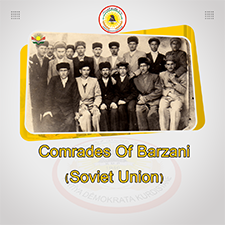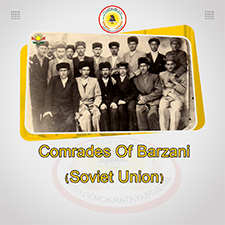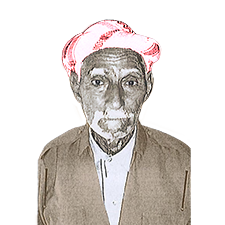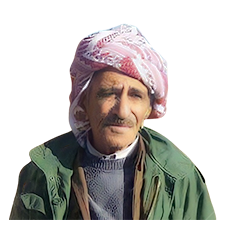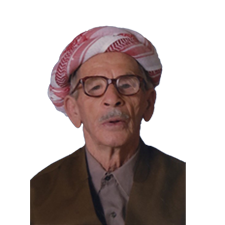Biography
In 1915, he was born in Barzan village in Barzan sub-district in Mergasor district in Erbil Governorate, and on the 21st of June 1932, he and his family became Refugees of Turkey. He got married before going to the Soviet Union, and his wife’s name was Buk Aish Hassan Farz and they had two daughters and a son: Zahra, Zakiya and Khalid. He had experience in both Kurdish and Russian languages, he passed away in Barzan village and buried there in 1968. On july 31, 1983, in the Barzanian Anfal operation his son Khalid was forcefully disappeared by the Iraqi government in the Qushtapa community.
Memoir of struggle
In 1943, he joined the Ranks of the Second Barzan Revolution and participated in its battles, and on August 19, 1945, by the order of the Iraqi Military Court, all of his moveable and immoveable properties were seized. After the failure of the Second Revolution of Barzan, he goes to eastern Kurdistan on 11 October 1945. On March 31, 1946, he became a peshmerga in the Barzan forces of the Kurdistan Democratic Republic’s Army and participated in the battles of the Saqiz front in the Kurdistan Democratic Republic.
He was one of the Peshmergas that returned to The Sherwan and Mazuri area Theough Northern Kurdistan land on 19 April 1947 through (Khwakurk and Barazagrawa plains).
After their return, General Mustafa Barzani held a meeting with his comrades in Argosh village on May 15, 1947, and allowed them to decide to stay, or go to the Soviet Union, where all his comrades decided to continue and go to the Soviet Union. On May 23, 1947, he accompanied General Mustafa Barzani to the Soviet Union and participated in the Battle of the stream of Qatur and the Battle of the Mako Bridge. He crossed the Aras River into the Soviet Union which is located in the border between Iran and the Soviet Union.
After their arrival in the Soviet Union, on June 19, 1947, they were placed with all their comrades in the city of Nakhchawan, in the Republic of Azerbaijan, for forty days in a deserted community surrounded by barb wires and were guarded by a group of soldiers and regarding food, clothing, and mobility they were treated as prisoners of war. Later, on the decision of the Soviet government, they were distibuted over the areas of Aghdam, Lachin, Ayolah and Kalbajar in Azerbaijan. On December 10, 1947, they were transferred to a military base on the Khazar Sea in The Capital of Azerbaijan, Baku, and on the 23th of the same month, they were given military uniforms and were trained eight hours a day under the supervision of Azerbaijani officers. At the same time, for four hours a day, they were taught Kurdish language lessons by some of their educated comrades.
After Jafaar Bagrov's ill treatment of his comrades, Barzani decides to move his military camp from Azerbaijan to The Chirchik community to Nearby Tashkent, the capital of Uzbekistan, where they will continue their military training.
In March 1949, he and his friends were distributed as groups and units into the rural villages of the Soviet Union by train and worked in the kolkhoz farms (land that people rented from the government and then paid back the government share).
After much effort and many letters sent by General Barzani to Stalin, a letter finally arrives in Stalin's hand in which Barzani discusses the problems of his comrades and Stalin immediately decides to form a committee to investigate the situation of Barzani's comrades, and finally the committee's decision is to gather them all in the city of Vrivski, so he will go to the Soviet city of Vrivski in November 1951.
Following the revolution of July 14, 1958 in Iraq and the return of General Mustafa Barzani, on February 25, 1959, in accordance with both Articles Three and Seven and section (A) of Article ten, and working with article 11, in accordance with the amended law No. 19 of 1959, he and his comrades were subjected to general amnesty.
In 1958, the Republic of Iraq was established under the presidency of Abd al-Karim Qasim, the aforementioned returned to Kurdistan on April 16, 1959, with his friends on the Groza ship via Basra port in southern Iraq. In 1961, he participated in the September revolution and participated in its battles until his death.
Sources:
-
حهمید گهردی، پوختهی مێژوونامه، چاپی یهكهم، (ههولێر - دهزگای چاپ و بڵاوكردنهوهی ئاراس - چاپخانهی وهزارهتی پهروهرده - ٢٠٠٤ز).
-
ڕێكارێ مزویری، سهربۆرا تراژیدیایێن بارزانییان، چاپا یهكێ، (ههولێر - چاپخانا حاجی هاشم - ٢٠١٣ز).
-
شهعبان عهلی شهعبان، ههندێك زانیاری سیاسی و مێژووی، چاپی سێیهم، (ههولێر - چاپخانهی ڕۆژههڵات - ٢٠١٣ز).
-
عمر فاروقی، سردار دانا زندگی و مبارزات مرحوم ملا مصطفی بارزانی، چاپ دوم، (ههولێر - چاپخانهی وزارت آموزش و پرورش - ٢٠٠٢ز).
-
عومهر ههمزه ساڵح، جینۆساید و تاوانهكانی ڕژێمی بهعس دژی بارزانییهكان ١٩٧٥ - ١٩٩١ له زمانی شایتحاڵ و بهڵگهنامهكانهوه، چاپی یهكهم، (ههولێر - چاپخانهی ڕۆژههڵات - ٢٠١٧ز).
-
كاروان محهمهد مهجید، بارزانییهكان له مههابادهوه بۆ سۆڤێت، چاپی یهكهم، (سلێمانی - چاپخانهی پهیوهند - ٢٠١١ز).
-
له یادداشتی فهرماندهی شههید حهسۆ میرخان ژاژۆكی، ٦٢ رۆژ لهگهڵ بارزانی دا چوونی بارزانییهكان بۆ یهكێتی سۆڤێت، چاپی یهكهم (ههولێر - چاپخانهی رۆشنبیری - ١٩٩٧ز).
-
لیث عبدالمحسن جواد الزبیدي، ثورة ١٤ تموز ١٩٥٨ في العراق، (بغداد - دارالرشید للنشر - ١٩٧٩م).
-
مسعود بارزانی، بارزانی و بزوتنهوهی رزگاریخوازی كورد ١٩٣١ - ١٩٥٨، (دهۆك - چاپخانهی خهبات - ١٩٩٨ز).
-
نهجهف قولی پسیان، له مهابادی خوێناوییهوه ههتا لێوارهكانی ئاراس، و. شهوكهت شێخ یهزدین، چاپی یهكهم، (پیرمام - یۆبیلی زێڕینی پارتی دیموكراتی كوردستان - ١٩٩٦ز).
-
ئـ.د.ئـ، فایلی ژماره AI-١٠، لیستی ههڤاڵانی مستهفا بارزانی بۆ یهكێتی سۆڤێت، بهڵگهنامه لهلایهن سهگڤان هاڵۆ پێشكهش كراوه، ٢٠١٦ز.
-
ئـ.د.ئـ، فایلی ژماره HB-١٦٦، پارتی دیموكراتی كوردستان، بارهگای بارزانی، لێژنهی باڵای ناوچهی بارزان، فۆرمی سلێمان شەریف مەلا حەسەن بایزدین، پیرمام، ١ تشرینی دووهمی ٢٠١٨ز.
-
ئـ.د.ئـ، فایلی ژماره ١٩٦-ZB، دهقی چاوپێكهوتن لهگهڵ عوبهید خالد سلێمان لهلایهن سامی عهبدی، پیرمام، ٢٥ شوباتی ٢٠٢٠ز.




